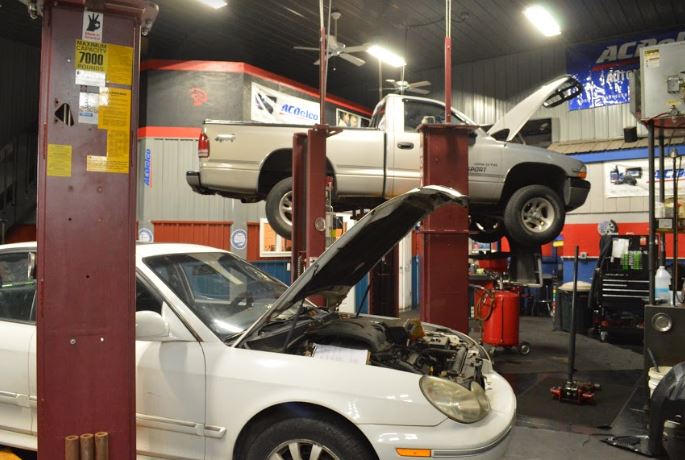All Categories
Featured
Routine engine tune-ups are necessary for preserving your lorry's performance, enhancing gas efficiency, and expanding its life-span. Whether you're a skilled car owner or a newbie, recognizing the crucial aspects of an engine tune-up can assist you keep your auto running efficiently for many years. Below are some crucial tips to direct you with the process.
- Change the Flicker Plugs. Ignition system are tiny yet mighty components that play a vital duty in igniting the fuel-air blend in your engine. With time, they can break or end up being fouled, resulting in inadequate engine efficiency, lowered fuel effectiveness, and hard starts.
Throughout a tune-up, examine your ignition system for wear and replace them as essential. For many vehicles, trigger plugs should be changed every 30,000 to 100,000 miles, depending upon the kind and material. Fresh ignition system make certain efficient combustion and smoother engine procedure.
- Check and Replace the Air Filter. The air filter is your engine's first line of protection versus dirt, debris, and other contaminants. A stopped up or filthy air filter can restrict air movement, triggering your engine to function tougher and take in more fuel.
Check your air filter throughout a tune-up and change it if it's dirty or previous its recommended service interval. A tidy air filter improves engine effectiveness and enhances gas economic situation.
- Check the Fuel System. Gradually, your gas system can build up dirt and carbon down payments, minimizing engine performance and fuel effectiveness. Cleaning up the fuel injectors and gas lines during a tune-up assists keep proper fuel delivery and burning.
You can utilize a gas system cleaner or have a specialist mechanic carry out a much more detailed cleaning. This action is specifically useful for older lorries or vehicles frequently driven in stop-and-go traffic.
- Evaluate the Belts and Tubes. Belts and tubes are crucial for different engine features, such as running the alternator, water pump, and a/c. During a tune-up, look for fractures, fraying, or indicators of wear on these elements.
Replace any type of worn-out belts and hoses to stop possible break downs. A broken belt or dripping hose pipe can cause engine getting too hot or loss of power, so dealing with these issues immediately is important.
- Replace the Engine Oil and Oil Filter. Engine oil is essential for oiling moving parts, reducing friction, and regulating engine temperature level. In time, oil ends up being infected and sheds its efficiency.
As part of a tune-up, change the engine oil and oil filter. Use the type of oil suggested by your lorry's supplier and stick to the recommended modification intervals. Tidy oil maintains your engine running smoothly and avoids early wear.
- Test the Battery and Charging System. A healthy battery is important for starting your cars and truck and powering its electrical systems. During a tune-up, check the battery's voltage and check the terminals for rust. Tidy the terminals if needed and make sure a safe connection.
In addition, test the generator and charging system to ensure your battery continues to be billed throughout procedure. If your battery is weak or old, consider replacing it to stay clear of unexpected break downs.
- Flush and Replenish the Coolant. The air conditioning system controls your engine's temperature, preventing it from overheating. Old or infected coolant can lose its effectiveness, causing potential engine damages.
Throughout a tune-up, purge the old coolant and replace it with a fresh mixture. Check the radiator, thermostat, and hoses for leakages or damages. Maintaining the air conditioning system in good problem guarantees your engine runs at the ideal temperature level.

- Address Caution Lights and Unusual Signs And Symptoms. Modern automobiles are equipped with diagnostic systems that notify you to potential issues via control panel warning lights. If your check engine light or any type of various other advising indicators are on, resolve them during your tune-up.
Furthermore, pay focus to uncommon signs and symptoms such as weird sounds, rough idling, or reduced fuel efficiency. A specialist auto mechanic can identify and resolve these issues during the tune-up procedure.
- Don't Fail To Remember the Exhaust System. Your automobile's exhaust system removes dangerous gases from the engine and makes sure correct exhausts. Inspect the exhaust system for leakages, corrosion, or damages throughout a tune-up. A damaged exhaust system can affect engine efficiency and cause environmental and safety and security issues.
- Use High-Quality Parts and Fluids. When changing components or completing fluids during a tune-up, always select premium products that satisfy your lorry's requirements. Utilizing substandard parts or inaccurate liquids can adversely affect your engine's performance and long life.
Conclusion: Regular Tune-Ups Are Trick to Engine Health And Wellness. Taking the time to tune up your engine ensures it runs effectively, saves gas, and decreases the threat of failures. Whether you perform these jobs yourself or count on a trusted auto mechanic, regular tune-ups are an investment in your lorry's integrity and long life. Adhere to these ideas, and you'll delight in a smoother, much more trustworthy trip for several years to come.
Latest Posts
Learn How to Cut Costs on Car Maintenance with Montclare Auto Repair’s Limited-Time Deals
Uncover Save Big on Car Maintenance with Montclare Auto Repair’s Exclusive Deals
Experience Your Financial Partner at WyHy – Top Perks for Your Future
More
Latest Posts
Learn How to Cut Costs on Car Maintenance with Montclare Auto Repair’s Limited-Time Deals
Uncover Save Big on Car Maintenance with Montclare Auto Repair’s Exclusive Deals
Experience Your Financial Partner at WyHy – Top Perks for Your Future